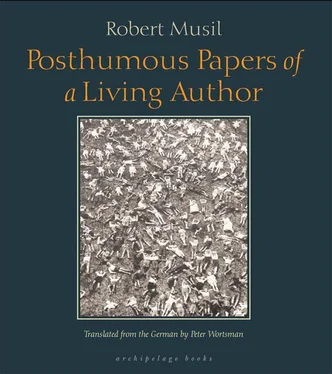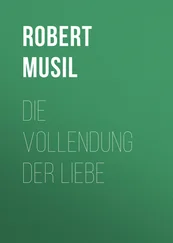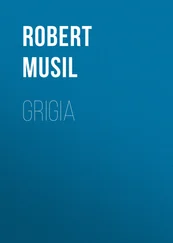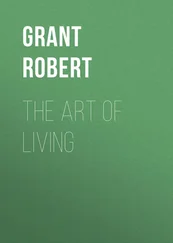This then was the apartment in which I stood as I watched the funeral; a fat woman had died, who had lived diagonally across from my window on the other side of the wide, and here somewhat bulging, thoroughfare. In the morning the carpenter’s boys brought the coffin; it was winter, and they brought it on a little handsled, and because it was a lovely morning, they slid down the street with their spiked shoes, and the big black box behind them jumped from side to side. Everyone who watched had the feeling, what handsome boys they were, and all waited expectantly to see if the sled would topple over or not.
But by afternoon the last of the escort already stood in front of the house: top hats and fur caps, fashionable haberdashery and winter kerchiefs dark against the light snow-gray of the sky. And the priests in black and red, with crenulated white shirts on top, came walking across the snow. And a young, big, shaggy brown dog chased after them and barked as though at a car. And if one may be permitted to say so, the dog did not express an altogether false perception; for, in fact, at that moment there was nothing particularly holy or even human about the approaching figures, but one was simply struck by the heavy motion of the mechanical side of their existence sweeping over the slippery ice-slick that covered the street.
But then the mood turned suddenly divine. A quiet bass intoned a wonderfully soft, sad song, in which I understood only the foreign words for sweet Mary; a baritone, shimmering light-brown like chestnuts, joined in, and still another voice; and a tenor soared over all the rest, while women with black kerchiefs flowed out of the house in an unending stream; the candles burned pale golden against the winter sky and all the implements sparkled. One would have wanted to cry then, and for no other reason than that one already was a human being over thirty.
Perhaps also just a little bit because the boys poked and punched each other behind the party of mourners. Or because the upstanding young man, to whom the dog belonged, stared motionlessly over everyone’s head at the holy service, and you couldn’t say why. Everything was just so full of facts that didn’t quite sit right, as in a china cabinet. And to tell the truth, I could hardly control myself and didn’t know where to turn, when by coincidence, in the midst of the crowd, I once again noticed that the deeply touched young man held one hand behind his back and his big brown dog began to play with it. Playfully he bit at it and tried to wake it up with his warm tongue. Impatiently I waited to see what would happen. And finally, after a long time, while the whole of the young man’s body remained frozen in unsettled exaltation, the hand freed itself behind his back and began playing with the dog’s mouth, without the man’s knowing it.
This once again made my soul regain its balance, without any real reason. At that time, in those surroundings where I forced myself to hold out, my soul slipped easily into chaos or order at the slightest upset. I was shot through with eagerness and anxiety in anticipation of the handshake that my housemates would offer me after the funeral, together with a little glass of their suspect homebrew and a few fitting words that were not to be contradicted: maybe, that misfortune brings people closer together, or something like that.
Maidens and Heroes
How lovely are you servant girls with your peasant legs and those peaceful eyes, about which you just can’t tell, do they wonder about everything or about nothing?! You lead the master’s dog by the leash like a cow on the line. Are you thinking about how the bells back in the village are ringing now, or are you thinking that the movie’s about to begin? The only sure thing is that you sense in some secret way that more men live in between the corners of the city than in all your country and you move at every moment through this male dominion, even if it doesn’t belong to you, as though through a farm field that brushes up against your skirts.
But are you aware, while your eyes pretend to know nothing, that it’s a man you lead by the leash? Or don’t you realize at all that Lux is a man, that Wolf and Amri are men? A thousand arrows pierce their hearts at every tree and lamppost. Men of their breed have left as their mark the dagger-sharp smell of ammonia, as though they’d stuck a sword into a tree; combats, brotherhoods, braveries, and desire, the whole heroic world of man unfolds itself into their sniffing imagination. How they lift a leg with the noble poise of a warrior’s salute, or the heroic sweep of a beer-glass-toasting arm at a drinking bout! With what earnest do they carry out their duty, that is surely a consecrated drink-offering like no other! And you girls? So thoughtlessly you drag these dogs after you. Tug on the leash; don’t grant them time, without even looking back at them. It’s a sight that’d make one want to throw stones at you.
Brothers! On three legs Lucky or Wolf hop after the girls; too proud, too injured in their pride to howl for help; incapable of any other protest than headstrong and stubbornly, in desperate farewell, not to let the fourth leg drop, while the leash drags them ever onwards. What inner-dog dismay must come of such moments, what desperate neurasthenic complexes lie buried there! And the main thing: Do you sense the sad comradely look he casts at you when you pass such a scene? In this way, he even loves the soul of these thoughtless girls. They aren’t heartless; their heart would be moved if they knew what was happening. But they just don’t know. And aren’t they for that very reason so ravishing, these hard-hearted things, because they know nothing at all about us? Thus speaks the dog. They will never understand our world!
Boardinghouse Nevermore
There once was a German boardinghouse in Rome. (Though besides this one there were also many others.) In those days in Italy, the German boardinghouse was a specific term that encompassed many varied and singular types. Even today I shudder when I think back to another one where I once lived; everything was so impeccable there you wanted to cry. But it wasn’t like that at the boardinghouse I am talking about. When I first stepped into the office and asked for the man of the house, his mother replied: “Oh, he can’t make it now; it’s his corns, you know!” I’d like to call him Mr. Nevermore. His mother, Mrs. Nevermore, was a matron of mighty proportions whose flesh had slipped back a bit over the years, so that her corset traced an uneven ring in the air around her. Over her corset a blouse was spanned; somehow she reminded me of an overturned, abandoned umbrella, the kind you sometimes find in vacant lots. Her hair, as far as I could tell, was never combed between Easter and October, that is, outside the tourist season. During the season it seemed to be white. Another one of her idiosyncrasies involved a skirt with an unusually long slit that stayed open from top to bottom when it was hot. Perhaps it was cooler like that, or perhaps it was a special feature of the house. For even Laura, the chambermaid, who served at the table, put on a clean blouse which, for this express purpose, closed at the back; but during the time I spent in Rome only the bottom two of all the hooks were ever done, so that above this Laura’s camisole and also her lovely back were presented on a chalice.
Still they were outstanding hosts, the Nevermores; their old-fashioned, luxurious rooms were well-kept, and whatever they cooked had a special touch. During meals Mr. Nevermore himself stood by as the head waiter beside the serving table and supervised the staff, which consisted, however, only of Laura. Once I heard him complain to her: “Mr. Meier fetched a spoon and the salt for himself!” Frightened, Laura whispered: “Did he say anything?” And with the quiet reserve of a royal steward, Mr. Nevermore replied: “Mr. Meier never says anything!” To such pinnacles of his profession could he raise himself. He was, so far as I can remember, tall, lean, and bald, with a watery look in his eyes and a prickly stubble on his cheeks that slowly shifted upwards and downwards when he bent over toward a guest with a bowl to discreetly point out something particularly delicious. They simply had their own ways, the Nevermores.
Читать дальше











